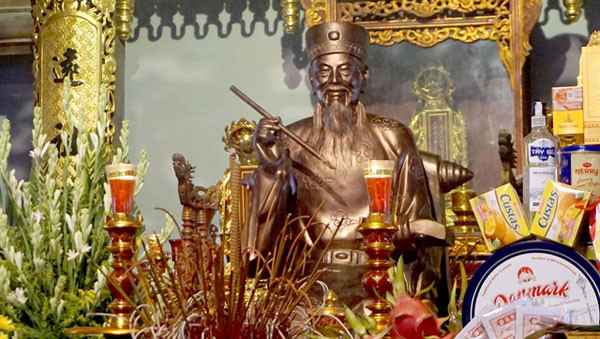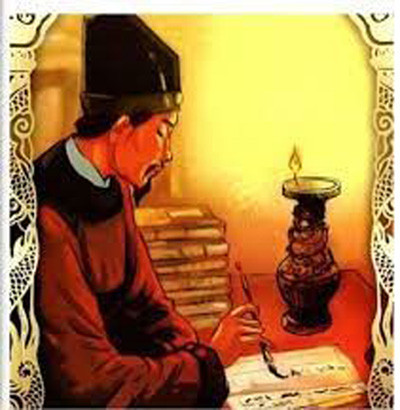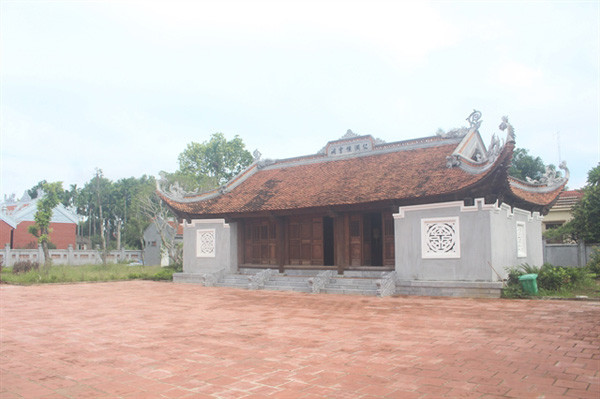
Le Van Huu (1230-1322), the first historian of the country to lay the foundations for Vietnam's national history, has been proposed to be celebrated worldwide as a cultural celebrity.
With his erudite knowledge, his solid historical method and rich emotional expression, he has been honoured as an outstanding educator, a national cultural celebrity and a perfect personality.
In gratitude for his great contribution to national history, the northern central province of Thanh Hoa recently set up a plan to complete the dossier of application to the United Nations Educational, Scientific and Cultural Organisation (UNESCO) in celebrating Le Van Huu as a cultural celebrity.
A scientific conference held recently by Thanh Hoa Province in co-ordination with the Vietnam Association of Historical Sciences to celebrate the 700th anniversary of his death highlighted Le Van Huu's life and career and particularly his Đại Việt Sử Ký (Annals of Đại Việt), the first and most important work on Vietnamese history.
Most participants, including leading experts, scientists and researchers, affirmed that Le Van Huu, the author of Đại Việt Sử Ký had laid the foundation for the nation's history.

They highlighted his great contributions to Vietnamese history and culture and his influence on national cultural development.
The conference agreed the People's Committee of Thanh Hoa Province and Vietnam Association of Historical Sciences should cooperate with functional sectors in developing a project on proposing that UNESCO consider world celebration for Le Van Huu.
The two agencies should also work with each other to prepare for the celebration of his 800th birthday in 2030.
Born in the Year of Tiger, 1230, in Phu Ly Village, in Thanh Hoa Province's Thieu Hoa District, Huu showed his intelligence from a very young age and set the direction for his life to devote to and brighten his homeland and the whole country.
He attended the first exam to select talents in the reign of Tran Thai Tong and was awarded the title Bảng nhãn (second highest ranked laureate) at the age of 17. He was then assigned to many important mandarin positions in the Tran Dynasty in law, military, academia and historical works.
During his time as a mandarin, he was known for his profound education, great virtue, and always loving and caring for the people. He dedicated and served with a desire to contribute to building a harmonious, peaceful, prosperous country.

After his death, inscriptions inscribed on Le Van Huu's grave with his biography praising his talent and career remained in Thieu Trung Commune. In 1990, the Ministry of Culture and Information recognised a temple worshipping him in the commune as a national historical relic.
Hoang Ba Tuong, deputy head of the Thanh Hoa Province's Party Committee's Publicity and Education sub-commission, said with his talent and virtue, Le Van Huu was a pride of Thanh Hoa, honoured in historical and cultural traditions.
Tuong, who has spent many years researching the historian, said: "His name is worth honouring on the 'golden board' of Vietnamese cultural celebrities."
Along with Thanh Hoa, the historian's homeland, many schools and streets in provinces and cities across the country have been named after him to honour his career, dedication, ideological values and ideals left to younger generations.
Thanh Hoa Province implemented a project between 2018-2022 on restoring and preserving the historical relic of Le Van Huu Temple with a total investment of over VND29 billion. The project was inaugurated in April this year.
First national historical work
The famous Đại Việt Sử Ký, a set of 30 books complied by Le Van Huu and completed in 1272, presents the historical conditions of the country over nearly 15 centuries from 207 BC to 1244.
Right from the first days of publication, the work showed its great contributions to the country's feats of national building and defending, helping the Tran Dynasty reach its most glorious development. Experts have confirmed the precious work is an important foundation for historians to research and study Vietnamese history.
A new version of the work titled Đại Việt Sử Ký Toàn Thư (The Complete Annals of Đại Việt), in Han or ancient Chinese characters, was released recently by the Van Hoc Publishing House.
The text was written, carved and printed by different generations of historians under the Le and Tran dynasties, such as Le Van Huu, Phan Phu Tien, Ngo Si Lien, Pham Cong Tru and Le Hy. It was first translated into Vietnamese by sinologist Cao Huy Du and released in 1967.
Đại Việt Sử Ký Toàn Thư is the oldest official historical text that is so comprehensive. It is an invaluable treasure of Vietnamese culture, a rich source of information to research into the history and other social science branches," said Vo Thuy Trang, a researcher and final-year student at the literature faculty of the HCM City University of Education.
Chairman of the Vietnam Association of Historical Sciences Tran Duc Cuong said that Le Van Huu was a bright example in studying and working, and his example should be more widely known in society, arousing pride and contributing to promoting more talents for his homeland of Thanh Hoa, and Vietnam in general.
The official said issues about the historian's biography and his work Đại Việt Sử Ký still need to be studied more deeply so that "our posterity will continue to preserve and promote the value of his heritage."
Do Trong Hung, secretary of Thanh Hoa Province's Party Committee, agreed and assigned the provincial Culture, Sports and Tourism Department in collaboration with Thieu Hoa District and functional agencies to review the criteria for the cultural celebrity to be celebrated worldwide and build a dossier to report to the Ministry of Culture, Sports and Tourism and the Government to submit to UNESCO.
Deputy Director of Thanh Hoa Cultural Heritage Conservation Centre Le Tri Duan said the centre was urgently working with units and scientists at the central and local levels to carry out activities, including the holding of conferences and compiling books about the national historian to translate into different languages.
"The original information and documents related to the historian and his life are increasingly clarified thanks to the search, discovery and exploitation of sources and his imprints in the homeland of Thanh Hoa, but they are still not enough," he said.
However, officials were keen to point out that, despite the desire to venerate one of the nation's greatest scholars, scientific records should be carefully prepared with the consultation of domestic and foreign experts.
Source: Vietnam News